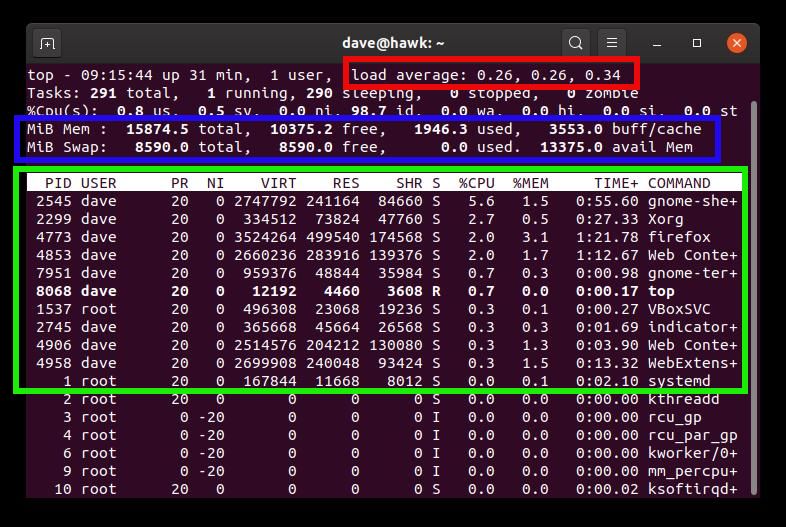Posted by Peter G. Shaw on 31/01/2020 20:06:42:…
One thing I can say is that from the discussion it looks as if the machine might not (yet) be past its use by date, merely suffering from an overdose of overloading…
Not difficult to overload older computers with new software. If Mint is being kept up-to-date, then demand for memory and resources will tend to bloat, however gentle the user. You said (my bold):
"… I was using Google Street View which made me suspect that Street View was causing Firefox to fail to release memory. Using System Monitor showed that when this problem occurred, the CPU history was 100% whilst the Memory & Swap History was usually quite high."
That suggests overload because Street View is memory, CPU and graphics intensive. Easy to prove one way or the other. Open a terminal window, and type the command top.

When top is running (refreshes every few seconds until stopped with ctrl-C), it shows statistics that may expose the problem. This is my Workstation computer, little me running Firefox with 3 tabs, everything else is system housekeeping. Despite 291 tasks running, this computer is lightly loaded.

First three numbers to note are in the red box. They show the average number of tasks queuing for a resource to become available. The resource could be cpu, disc, network, display, memory, keyboard, printer, whatever. First number is the size of the queue now, second the queue size 5 minutes ago, third queue size 15 minutes ago. Rule of thumb for a UNIX Server, queue now shouldn't be more than 3.0. Workstations run with shorter queues because humans are sensitive to delays. If the queue is too big, it's due to the system is bottlenecking due because 1 or more resources are busy.
RAM is often the most critical resource in a computer. If it's big enough for all queuing tasks to stay in memory, response will be quick. Response is much slower when the task is swapped to disc and has to be retrieved: hard drives are sluggish.
Computer memory usage is summarised in the blue rectangle. Although I have 16Gb RAM installed, only 15.87Gb is actually available. 1.946Gb is actually in use, which is perilously close to Peter's maximum 2Gb available, and Russells' minimum needed for Mint. But, modern operating systems will use spare RAM. My system has another 3.55Gb of RAM for cache/buffer. Most buffering is of open files: if the operating system has space it will read the contents of open files into memory and leave it there because it's likely the contents will be used again. On a system short of memory, only small portions of each file can be read at a time, and physical discs will be kept busy, each transaction wasting a few milliseconds. On a system with plenty of memory, most transactions take microseconds. Then, because discs have much less to do in a memory rich system, other tasks are less likely to have to queue for disc. So, it's important to have enough memory. Although Mint can run in 2Gb, 4Gb is more sensible, 8Gb comfortable, and 16Gb generous.
Blue box shows I have 8Gb of swap available and none of it is being used. Ideally, computers should never need swap memory because it's slow. Swap can degrade into 'thrashing', ie the computer is so overloaded that everything has to be swapped before it can run. The computer runs extraordinarily slowly, perhaps taking several minutes to complete work normally taking less than a second. Symptoms are high CPU and high disk activity. Fitting an SSD helps in this situation because they respond faster than a hard drive, but the main cause is insufficient RAM.
Lastly the box in yellow highlights the most expensive CPU tasks. Of note is Firefox, which is not only big, but is 4 separate tasks. There's a core Firefox plus a 'Web Content' for each tab, and another process called 'Web Extensions', which I guess runs ad-blocker, security and privacy plug-ins. Browsers are heavy on a system, for example consuming a lot of memory and disc space by cacheing web-pages.
When a system misbehaves 'top' is a good place to start. Other tools like nethog and iotop can be used to focus on network and input-output hogs if necessary. But most poor performance is caused by insufficient RAM and slow hard drives. Be aware that older computers are slow throughout and unlikely to benefit fully from bolting on new components. If it works at all, the new part will throttle back into compatibility mode and chug along in the slow lane. (Which may be good enough!)
Dave
Peter G. Shaw.






